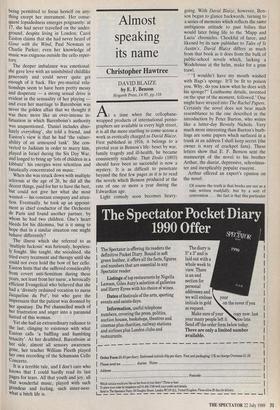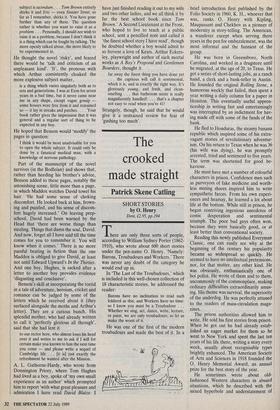Almost speaking its name
Christopher Hawtree
DAVID BLAIZE by E. F. Benson
Hogarth Press, £4.95, pp.316
At a time when the cellophane- wrapped products of international porno- graphers are available in every high street, it is all the more startling to come across a work as erotically charged as David Blaize. First published in 1916, it belongs to a pivotal year in Benson's life: beset by war, family tragedy and ill-health, he became consistently readable. That Dodo (1893) should have been so successful is now a mystery. It is as difficult to penetrate beyond the first few pages as it is to read the novels which Benson produced at the rate of one or more a year during the Edwardian age. Light comedy soon becomes heavy- going. With David Blaize, however, Ben- son began to glance backwards, turning to a series of memoirs which reflects the same ambiguous attitude to past follies that would later bring life to the `Mapp and Lucia' chronicles. Chockful of farce, and likened by its new publisher to Tales of St Austin's, David Blaize differs as much from that book as it does from the bulk of public-school novels which, lacking a Wodehouse at the helm, make for a grim trawl.
"I wouldn't have my mouth washed with Bags's sponge. It'll be fit to poison you. Why, do you know what he does with his sponge?" Loathsome details, invented on the spur of the moment, followed.' One might have strayed into The Rachel Papers. Certainly the novel does not bear much resemblance to the one described in the introduction by Peter Burton, who writes like a latter-day Beverly Nichols. Very much more interesting than Burton's burb- lings are some papers which surfaced in a trunk at an address I shall keep secret (the owner is wary of crackpot fans). These letters show that E. F. Benson sent the manuscript of the novel to his brother Arthur, the diarist, depressive, schoolmas- ter and inexplicably popular essayist.
Arthur offered an expert's opinion on the novel:
Of course the truth is that books are not as a rule written truthfully, but by a sort of convention . . . the fact is that this particular subject is tacendum . . Tom Brown entirely shirks it and Eric — even Sinister Street, so far as I remember, shirks it. You have gone further than any of these. The question rather is whether you want to raise it as a problem . . . Personally, I should not wish to raise it as a problem, because I don't think it is a thing which can be fought by talking. The more openly talked about, the more likely to be experimented in.
He thought the novel 'risky', and feared there would be 'talk and criticism of an unpleasant kind'. the pronoun with which Arthur consistently cloaked the more explosive subject matter, is a thing which varies singularly both as to sets and generations. I was at Eton for seven years in a bad time, but it never came near me in any shape, except vague gossip some houses were free from it and remained so — it lay in streaks and patches. . . . Your book rather gives the impression that it was general and a regular sort of thing to be expected in any boy.
He hoped that Benson would 'modify' the pages in question:
I think it would be most unadvisable for you to open the whole subject. It could only be done by a fanatical medical man, with a knowledge of nervous pathology.
Part of the manuscript of the novel survives (in the Bodleian) and shows that, rather than heeding his brother's advice, Benson added to these pages, notably the astonishing scene, little more than a page, in which Maddox watches David towel his hair. 'He had some sense of choking discomfort. He looked back at him, frown- ing and puzzled, and his sense of discom- fort hugely increased.' On leaving prep- school, David had been warned by the Head that 'there are worse things than stealing. Things that damn the soul, David. And now, forget all I have said till the time comes for you to remember it. You will know when it comes.' There is no more painful beating in fiction than the one Maddox is obliged to give David, at least not until Edward Upward's In the Thirties. And one boy, Hughes, is sacked after a letter to another boy provides evidence `disgusting and conclusive'.
Benson's skill at incorporating the torrid in a tale of adventure, heroism, cricket and romance can be judged by some of the letters which he received about it (they surfaced alongside the moths and Arthur's letter). They are a curious bunch. His splendid mother, who had already written to call it 'perfectly glorious all through', said that she had lent it
to our rector here, who almost loses his head over it and writes to me to ask if I will for certain make you known to him the next time you come — and please write a sequel of Cambridge life . . . fit is] just exactly the refreshment he wanted after the Mission.
A. L. Gathorne-Hardy, who wrote from Donnington Priory, where Tom Hughes had lived as a boy, spoke of 'my own small experience as an author' which prompted him to report 'with what great pleasure and admiration I have read David Blaize. I have just finished reading it out to my wife and two other ladies, and we all think it by far the best school book since Tom Brown.' A Second Lieutenant at the Front, who hoped to live to teach at a public school, sent a pencilled note and called it `the finest school story I have read', though he doubted whether a boy would admit to so fervent a love of Keats. Arthur Eckers- ley, playwright and author of such mortal works as A Boy's Proposal and Gentlemen Boarders, thought it far away the finest thing you have done yet . . the captious will call it sentimental, which it is, and in exactly the right way. It's gloriously young, and fresh, and clean- smelling . . . that bathroom scene is really magnificently handled! . . . that's a chapter not easy to read when you're 41!
Strangely, though, he said that he would give it a restrained review for fear of `gushing too much'.



















































 Previous page
Previous page